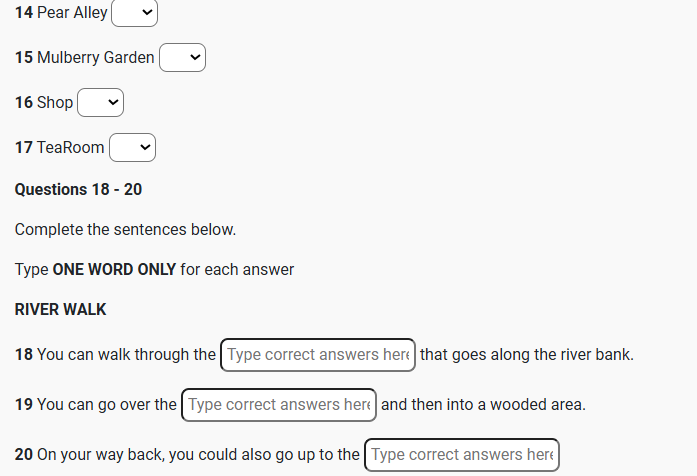IELTS Listening THE HISTORY OF ROSEWOOD HOUSE listening practice test has 10 questions belongs to the Historical / Architecture subject.
GUIDE:

Welcome, everybody, to the lovely house and gardens of Rosewood, once the home of the famous writer, Sebastian George. once bought the house in 1902 although he had first seen it two years earlier. Q11 At that time the owners let it out to a tenant because George was too slow making up his mind to buy it. When it came back on the market, there was no hesitation and lie bought it immediately, for £9,300, even though the house had no bathroom, no running water upstairs, and no electricity.
🎧Attempt Free Listening Test…
When he came here, he’d been married for ten years. During that time, he’d become one of the most famous writers in the English-speaking world. His professional success was enormous, but his personal life wasn’t as successful. Q12 He was no longer on speaking terms with his brother and had been devastated by the death at the age of seven of his elder daughter, Josephine.
Moving to Rosewood allowed the family to start a new life. Q13 George regarded Rosewood as a pure example of a traditional country house of this part of England and did some of his most successful writing here. The house and its grounds became the family haven and their escape to privacy and quiet. The walls and the mullioned windows were built of the local sandstone, the tiles on the roofs and the bricks of the chimney stack were baked from local clay, and the wooden structures inside came from oak trees which grow around here.
Now, please look at the map I’ve given you of the house and gardens. We’re here at the Information Centre. Follow the path marked with the arrow and the first area you come to is the orchard on your left.


Q14 As you go further down the path, there’s the kitchen garden on the right and as you go round the first sharp corner you will find, to your left, an area where different types of pear tree have been planted as well as some lovely flowers, and this is known as Pear Alley -designed by George himself.
Next to this is the greenhouse where some exotic plants and fruits are grown. Follow the path round the second corner and on your right you will see the entrance to the Mulberry Garden with its 500-year-old tree. Q15 Past the Mulberry Garden, follow the path until you reach the front of the house. I suggest you spend a good hour wandering around this lovely building. A guide takes visitor groups round every two hours.
Q16 If you would like to purchase any of George’s books or other souvenirs, then leave the house by the side entrance, where yon will find our shop, which is situated between the house and the garage which contains the magnificent old Rolls-Royce car which used to belong to George. I expect by this time you may also be in need of a rest and some refreshment. Q17 Most visitors are, so why don’t you visit the tea room on the far side of the garage?
If you have time, there is a lovely walk down towards the River Dudwell. For me, this is the best part of the estate. This isn’t on the map but it is all clearly signposted. You cross the Q18 field which spreads along the banks of the river. In spring, this area is well worth a visit.
Spend a minute or two watching the water pass by underneath as you cross the Q19 footbridge, and then continue along the River Walk through the woodland. On a hot summer’s day, the trees along this path provide welcome shade. Eventually, you come to the water mill which used to provide the electricity for the house – only about four hours every evening – in George’s time. And, finally, for those of you who would like to see stunning views of the surrounding countryside and who are a little bit more energetic, when you return from the mill take the first turning on your left and climb up to the Q20 viewpoint. You won’t regret it.
Enjoy your visit!
🎧Attempt Free Listening Test…
Learn From Experienced Teacher Best IELTS Coaching Dehradun Best IELTS in Dehradun Uttarakhand GMS Road BEST coaching in Dehradun Apply for Class Courses Today Good Results.
![]()
8439000086
8439000087
7055710003
7055710004
IELTS Simulation 323 GMS Road, Near Ballupur Chowk, Dehradun, India
![]()
email: info at ieltsband7.com
Boost Your Score: Practice IELTS Online with IELTS Simulator Prepare for IELTS Effectively Using IELTS Simulator Ace the IELTS: Try Realistic Practice on IELTS Simulator IELTS Simulator: Online Practice to Improve Your IELTS Score Rocky Bay field trip listening practice test has 10 questions belongs to the Leisure & Entertainment subject. Prepare for IELTS IELTS Test International Experienced Teacher Best Training By CELTA Trainer. Best Results Easily Get Required Score IELTS Exam Dates Available, Small Batch Size with Flexible Time, Professional. Easily Get Required Score I am interested in IELTS Pass with Confidence, Dehradun Small Batch Size with Flexible Time, professional faculty. Learn From Experienced Teacher Best IELTS Coaching Dehradun Best IELTS in Dehradun Uttarakhand GMS Road BEST coaching in Dehradun Apply for Class Courses Today Good Results. Small Batch Size, Flexible Time and Professional IELTS Teacher Best IELTS coaching classes IDP certified British Council trained and CELTA certified experienced trainer. Easily Get Required Score Tel:8439000086 Tel:8439000087 Tel:7055710003 Tel:7055710004 Tel:7055710009

Good